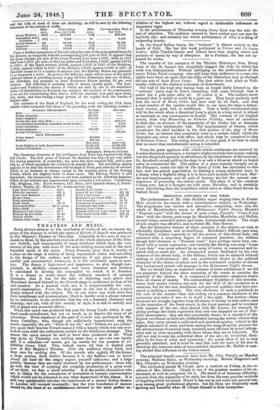PRINCIPAL CONCERTS OF THE WEEK.
The performances of Mr. John Hullah's upper singing-class, in Exeter Hall, closed for the season, with a miscellaneous concert, on Wednesday. The programme was various and attractive; comprising, inter alia, the whole of Mendelssohn's music to Midsummer Night's Dream, Mozart's " Possenti numi " with the chorus of male voices, Purcell's "Come if you dare" with the chorus part-songs by Mendelssohn, Moscheles, and Hullah, several songs, concerted pieces, and some instrumental music. The corps of solo singers was effective, and included Mr. Sims Reeves.
But the distinctive feature of these concerts is the chorus—so vast, so admirably disciplined, and so intelligent. Moscheles's difficult part-song, "Daybreak," written expressly to try the powers of this choral body, was executed with a surprising degree of sustained precision; the sublime though brief choruses to " Possenti numi " have perhaps never been ren- dered with so much expression; and certainly the stirring war-song "Coma if you dare" was never echoed by an army of voices so numerous and in- spired with so much fire. An unexpected power, facilitated by the very vastness of the choral body, is the delicacy which can be attained without sinking to ineffectiveness: this was excellently shown in the subdued character of the chorus of priests and in the murmured snatches of chorus that background certain solo passages in the Midsummer Night's Dream.
But we should form an imperfect estimate of these exhibitions if we did not penetrate beyond the mere execution of the music to consider the materiel of the chorus. It is composed of volunteers—amateurs drawn from all classes of society. The extraordinary discipline of this miscella- neous body speaks volumes not only for the skill of the conductor as a musician, but for the tact, kindliness, and personal qualities that have pro- cured so striking a mastery. The very obedience of such a multitude to the rule of the master—that rule resting on a common obedience to the symmetry and order of art—is in itself a fine sight. But further—these amateurs are brought together from all classes of society to take active part in the execution of the finest music, in the finest manner, and in company with masters of the art—they shared with Mr. Reeves, for example in giving perhaps the finest expression that ever was imparted to one of Ilur- cell's masterpieces: they are thus practically drawn to a standard of the highest excellence in their art; redistributed among the society whence they came, they carry abroad a cultivated and practical opinion, refined to the highest standard of taste, and form among the mentor society pioneers for the advancement of musical taste, rendered most efficient by sound inform- ation and by close sympathy with those whom they are to influence. We will not stop to note the testhetical effect of the art—its incidental disci- pline in the love of order and symmetry: the moral effect of art is very generally admitted; and it must be seen that with the wave of his arm in directing this immense mass of accomplished choristers Mr. Mullah is cast- ing abroad that influence to the widest extent.


























 Previous page
Previous page